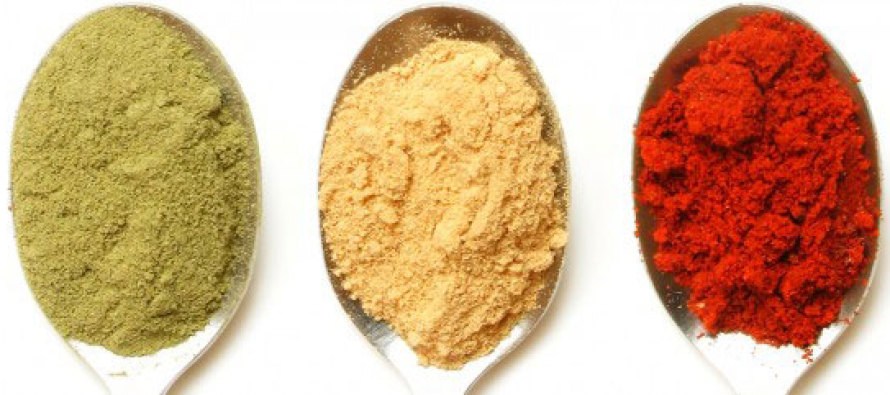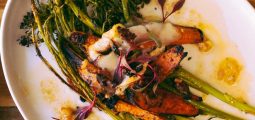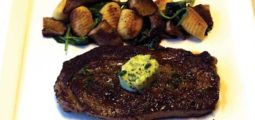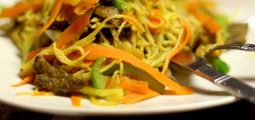The Ethos of Cooking

Often when we cook, we think only of ingredients, number of diners, seasonality, or cost, but rarely do we consider the attitude we have to muster in order to pull certain kinds of dishes off. One may say, “I don’t feel like cooking,” but perhaps the right response is, “You don’t feel like cooking what?” Here, then, from my experience in the kitchen and from reading and watching other cooks, are the emotional states necessary to succeed with various dishes in the broad span of kitchen life.
Powder-leavened Baked Breads
Be delicate, deft, and deliberate with your quick breads, muffins, biscuits, scones and biscotti. Do not whistle, but hum softly and breathe through the nose. Stand at ease, shoulders back, ready to come up onto your toe points. Have a blistering hot oven ready before you wet a molecule of flour. Mix the dry ingredients with the steady force of a cement mixer. Fold the wet ingredients in and, mix the dough with a hand that could cradle a baby (or a spoon) until scarcely over the threshold of combined and lumpy. Hands up! Picture Michelangelo, not hacking away at David with a pile driver, but lovingly tapping the cheekbone, and then smoothly withdrawing. Overworking destroys sculpture and biscuits alike. When mixed, without dallying, plop the dough with speed and accuracy onto a baking sheet, and slip it into the oven like you’re crossing the line of the Paris Tours one-day cycling classic.
Kneaded Breads and Pasta
Be forceful and vigorous with bread and pasta doughs. The only way to ruin it is to put in too much flour, so go light and add as you go. Sing the “Rocky” theme song in your head, or Beethoven’s “5th,” crack your knuckles, stretch your calf muscles and lay into it, mixing the ingredients with relentless oomph. Form a ball, thwack it, smack it, swing it like a baseball bat and slap it onto the counter. Shove it, fold it, and smush it onto itself. What doesn’t kill it only makes it stronger. Regard its texture skeptically, and will it to be smooth and silky. Then walk away and leave it alone like an irritating lover after a tempestuous argument. For pasta, whip it through the roller and cutter as if fabricating steel and being paid by the piece. For bread dough, ignore it–be utterly blasé, and when it is nearly too big for its bowl, start in on it again, then walk away again. Flex your muscles, ice your tendonitis, and repeat the physical cycle of exertion and neglect, and finally, slash the top in a flourish of triumph, and bake. Time with the seriousness of an Olympic trial. Cast pasta willy-nilly into boiling water and hover like Darryl Porter at home plate.
Butter Pastry
Be zen-like and focused when you handle pie crust and pasty. If you must touch it at all, do so as if it is C-4 or enriched plutonium. No music. Utter silence. Gently, gently bring the ingredients together with a fork or spatula, in a nested bowl surrounded by the most frigid ice water possible if you are a sissy—no touching!—and speedily wrap the dough in plastic, and rush it pell-mell into the fridge for a lengthy quarantine. When forced to work it again, be calm and alert, dexterous and swift as a Navy Seal setting detonators. Roll it out, cut it and re-chill. Remove from the cold, and avoiding hand contact with surgical skill, begin the final stage of panning up. Touch it only if absolutely necessary. It’s not TNT; it’s worse; it’s butter. If you’re using shortening, go ahead and massage away, it’s not worth eating anyway and your tasteless dough will be useful for hurling at barking dogs. Work the final filling, docking or shaping and try not to let your hands shake or sweat dot the perfect pastry. Bake, and breathe deeply in a decompression chamber or hot tub.
Fresh Produce Prep
Be lively and nimble-fingered when paring, peeling and dispatching vegetables and fruits. Listen to Vivaldi or Stravinsky and leap gracefully to the refrigerator. Pivot on the balls of your feet, with the heel lifted, and glide to the counter like Baryshnikov coming center-stage for an ovation. Peel with advancedly trained muscle memory, but sprightly lest you bog down in a pile of peelings and beet root ends. Remove the piles neatly by collecting them on sheets of soy newsprint and lightly waltz them to the compost, and commence cutting. Tilt your knifeblade away from your busy fingers, grip the handle with practiced ease, not a white-knuckled stranglehold. Note the various densities of your vegetables, the scents, the colors, imagine the glossy braise, or crisp stirfry, dewy freshness, or Maillardian roasty brown that your plant bits will display. As you move about the kitchen, keep your knees bent, absorb the shock, and never pound the floor with your heels, causing the wine glasses to tremble and clink. Present your blanched, stewed or stir-fried fruits and veggies breezily, and move on with a light heart and a lighter step.
Animal Protein
Be somber and mindful when trimming and trussing and dressing meat, birds and fish. Mahler or Brahms is appropriate, or Delta Blues or gospel music if your prefer. With respect, gratitude, and hope, trim, slice and denude the protein. Hold in your mind the carbon cycle, and the great circle of life. Run your tongue over your protruding canine teeth, and artfully rub the roast with lemon, spray and speckle with salt and pepper, splash with wine. Recall savory dishes of the past, when family sat round a hunk of something and sang or didn’t, and went away full, adamant and rich. Watch your grill, oven or skillet with the cool nerves of the secret service scanning a crowd and never, never prematurely turn, poke, prod, or wrestle the meat. A light testing with the tip of a washed finger in a prudent amount of time, like a vintner, silent, but flushed with anticipation. Make the call—done or not—with the conviction of a referee at a World Cup final, and serve with unwavering confidence and bursting generosity.
Late-Night Snacks
Be drunken and vociferous when preparing a latenight or early morning feast, such as pasta carbonara, fried rice, or apple waffles. Close the door to the wing or floor of the house where the children or old people are sleeping, and loudly play Chaupin, Lizst, Bob Marley, or Sold Me Down the River by the Alarm. Sway breathlessly close to the hot pan or iron or boiling water, but recover with surprising ease, and then check and recheck the ingredient list to find the one that you were about to disastrously omit. Laugh hysterically and get the hiccups while smashing garlic or grating apples with the drooling wanton bliss of a dental patient on nitrous oxide. Burn or spill something, giggling helplessly and then shush everyone sternly and demand another prosecco. Lurch about the kitchen until slightly dizzy, and have your most exhausted guest set the table. Use the last two clean pots in the kitchen, abjure the mess, and produce perfectly cut garnishes at the last moment. Serve with tipsy gentility. Gobble down food communally and swoon.
A Word to Cooks
While you are mastering the above skills, avoid violating the major rules of culinary emotional freedom:
- Never ask anyone’s opinion about what to cook if they are going to eat.
- Never say, “Don’t worry, you’re going to love this.”
- Always keep your guests waiting, but not in trepidation.
- Never give out recipes at the table, and only afterward if asked.
- And never, ever, ever, no matter how horrendous things turn out, never apologize for the food at the table. Do it later, and admit when you botch it. If food poisoning is involved, send flowers.
By sticking to your cooking guns, you may not avoid catastrophe, but you will learn to express yourself freely in the kitchen, without dependence or guilt-inducing rancor, and produce flavor-balanced and mentally balanced meals.

Ann Summers
Ann Summers is not a 40-umpthing-year old rock climber who got shut down in Boulder Canyon and drowned her failure in a microbrewery. She is neither a mother of two, a fan of Latin plant names nor a lover of fine Italian Grappa. You’ll not catch her shooting guns for fun or hollering like a redneck. She hates Shakespeare, and doesn’t call a certain fast food chain “The Scottish Restaurant.” She turns her nose up at organic yellow beets, eschews fresh oysters, and loathes chubby guinea pigs with Violent Femmes hairdos. She is also a dreadful liar
No comments
Write a commentOnly registered users can comment.











